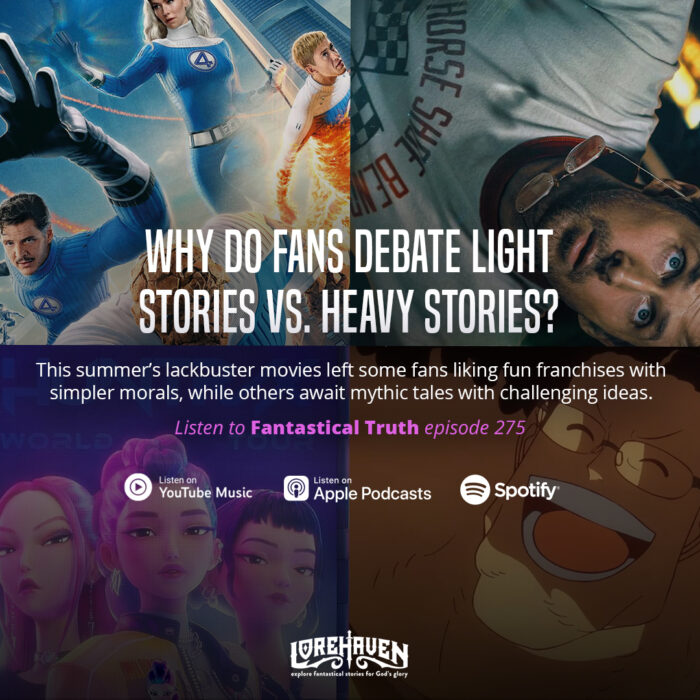275. Why Do Fans Debate Light Stories vs. Heavy Stories?
Podcast: Play in new window | Download (Duration: 1:07:14 — 62.9MB) | Embed
We’ve just seen the end of this year’s summer blockbuster movie season, such as it was. Most of the drama was about the movies rather than in the movies. Fans debate whether stories should be lighter, focusing on “fun” with simple virtues, as opposed to heavier stories with “serious” ideas. Right now it seems Team Light Stories is winning over Team Heavy Stories—and yet nobody is really winning at the box office. How can Christian fans engage stories that are light versus heavy?
Episode sponsors
- Enclave Publishing: Winter’s Chill by Morgan L. Busse
- The Waymaker’s Foresight by Dan Megill
- Above the Circle of Earth by E. Stephen Burnett
Mission update
- New at Lorehaven: Marian’s article about K-Pop Demon Hunters
- New reviews: Unfixed by Amy L. Saunders, Illuminary by Chawna Shroeder
- Subscribe free to get updates and join the Lorehaven Guild
Quotes and notes
- “The Operating System Of Cyberpunk Fiction,” Zackary Russell
- “Screwtape Wants You to Think Only Horror is Real, but Joy is Sentimental,” E. Stephen Burnett
1. Many fans favor light or fun colorful stories
- By “light” or “fun,” we mean simpler/popular morals, lots of jokes, color.
- We don’t mean flippant or crude stories, though some can tend this way.
- These stories often embrace or lampshade long-familiar genre tropes.
- They often get praised by fans and critics, but fail to set many records.
- Lots of people liked the new Superman movie (but not Stephen or Zack).
- And many people liked the new Fantastic Four (but it’s also struggling).
- Neither film did better than most DC or Marvel films of the past, pre-2020.
- And yet more of the big franchises are choosing this creative direction.
- Critics who want “realism” must recall that real people like lighter stories.
- Maybe these fans tend to like simple reminders about simple ideas/truths.
- When real life is a struggle, these fans like to escape into simpler stories.
- These fans prefer plain “inspirational” figures over “aspirational” heroes.
2. Other fans enjoy heavier or serious stories
- And by “heavier” or “serious” stories, we mean challenging, realistic tales.
- We don’t mean nihilistic or deconstructive, though some tend this way.
- These stories often embrace human tradition (a better version of “trope”).
- They often find praised and criticism by fans and critics, and set records.
- Fans loved the Star Wars Andor series and more-serious Marvel/DC stories.
- And many people like Christopher Nolan’s many films, Dune, and similar.
- But these stories (in books or cinema) often prove high-risk for many fans.
- So they are playing better on less-expensive media, such as streaming TV.
- Critics who want “fun” must recall that life isn’t like a shallow movie-land.
- These fans may like complex reflections of many challenging ideas/truths.
- When real life is a struggle, these fans like stories that provide answers.
- These fans prefer “aspirational” heroes over plain “inspirational” figures.
3. More fans embrace light and heavy stories
- A surprising amount of franchises insist on both approaches all at once.
- Some moments are comedic/whimsical; others are dark, challenging, heavy
- Many manga and anime stories do this, such as Eiichiro Oda’s One Piece.
- Recent OP plot: “pastor” turns pirate cyborg to save his adopted daughter.
- Even the smash hit K-Pop Demon Hunters reflects light and heavy ideas.
- Fans love the teaser for Project Hail Mary adapted from Andy Weir’s novel.
- The original Star Wars films as well as Rogue One are both light and heavy.
- Alas, studios struggle with these balanced films, but books may do better.
- Perhaps these stories best reflect our reality of plain and complex ideas.
- Real fans like both light ideas/truths and heavier, more challenging themes.
- This may better match real life, with times to escape and seek out answers.
- These stories show “inspirational” figures like us and aspirational heroes.
Com station
Top question for listeners
- During hard times, do you tend to favor light or heavier stories?
Next on Fantastical Truth
Over summer and school seasons alike, many Christian parents want books for their kids that don’t have things like “Agenda” or “Wokeness.” But in our zeal to keep bad, poisonous content out of books, might we miss our children’s more important need to enjoy good, nutritious content in our fantastical fiction?































Share your thoughts about this podcast episode